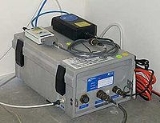
Seismometer
Overview
Seismic wave
Seismic waves are waves of energy that travel through the earth, and are a result of an earthquake, explosion, or a volcano that imparts low-frequency acoustic energy. Many other natural and anthropogenic sources create low amplitude waves commonly referred to as ambient vibrations. Seismic waves...
s generated by earthquake
Earthquake
An earthquake is the result of a sudden release of energy in the Earth's crust that creates seismic waves. The seismicity, seismism or seismic activity of an area refers to the frequency, type and size of earthquakes experienced over a period of time...
s, volcanic eruptions
Volcanic Eruptions
Volcanic Eruptions is a company owned by Crispin Glover. The company produces and issues Glover's work: It has released two films to date, What Is It? and its sequel, It is Fine! EVERYTHING IS FINE . Its current plans include releasing the final film in the trilogy titled It Is Mine...
, and other seismic source
Seismic source
A seismic source is a device that generates controlled seismic energy used to perform both reflection and refraction seismic surveys. A seismic source can be simple, such as dynamite, or it can use more sophisticated technology, such as a specialized air gun. Seismic sources can provide single...
s. Records of seismic waves allow seismologist
Seismology
Seismology is the scientific study of earthquakes and the propagation of elastic waves through the Earth or through other planet-like bodies. The field also includes studies of earthquake effects, such as tsunamis as well as diverse seismic sources such as volcanic, tectonic, oceanic,...
s to map the interior of the Earth, and locate and measure the size of these different sources.
The word derives from the Greek
Greek language
Greek is an independent branch of the Indo-European family of languages. Native to the southern Balkans, it has the longest documented history of any Indo-European language, spanning 34 centuries of written records. Its writing system has been the Greek alphabet for the majority of its history;...
σεισμός, seismós, a shaking or quake, from the verb σείω, seíō, to shake; and μέτρον, métron, measure.
Seismograph is another Greek term from seismós and γράφω, gráphō, to draw.
Unanswered Questions

